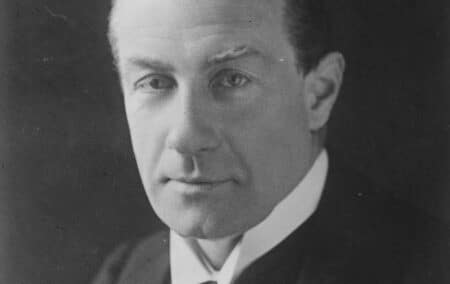Earlier this month, Queen Elizabeth II entered the 70th year of her reign, her father, King George VI, having died on 6 February 1952. Had his elder brother, King Edward VIII, remained on the throne and fathered an heir, she might never have become queen. Had he remained on the throne without producing an heir, she would have become queen 20 years later than she did, for her uncle outlived her father by two decades.
Edward VIII succeeded his father, King George V, in January 1936, the beginning of the year of three kings. In December of that same year he abdicated, to be succeeded by George VI, whose daughter Elizabeth was then only 10 years of age.
Edward VIII, known in the royal family as ‘David’ – the last of his seven Christian names – chose to abdicate after his prime minister, Stanley Baldwin, made it clear to him that he could not remain on the throne if he persisted with his plans to marry Wallis Warfield Simpson, who had been divorced from her first husband and was in the process of divorcing her second in order to marry him.
The political crisis over Edward VIII’s marriage plans lasted for less than two months. Baldwin first discussed the impending divorce with the king on 20 October 1936. On 10 December of that same year the king abdicated and went into exile, marrying Mrs Simpson in June 1937 as soon as her divorce was finalised. The couple, now Duke and Duchess of Windsor, lived afterwards mainly in Paris, among whose main attractions were that the French government gave them virtually rent-free accommodation, provided bodyguards, and did not make them pay income tax.
Deft management
Baldwin’s deft management of the king and the abdication was one of his most important achievements as prime minister, which office he held on and off three times between 1923 and 1937.
This was of course a constitutional matter. The essence of the Westminster system is that British prime ministers hold that office only for as long as they can command a majority in the House of Commons. Also important is that British monarchs are also ultimately subordinate to Parliament. Edward VIII quit the throne, without fuss, because he understood that rule. Many of his predecessors resisted it, but by the time he came to the throne it was no longer open to challenge.
At a meeting on 16 November, Baldwin told the king that the country would not approve of a marriage to Mrs Simpson. The king replied that he would then abdicate in order to marry her. Ten days later the king floated the compromise of a morganatic marriage: he would marry Mrs Simpson not as king but in one of his other capacities, such as Duke of Cornwall or Duke of Lancaster. She would then become not queen, but a duchess.
This, however, would have required special legislation, which the government was not willing to introduce. The king dropped the idea.
The king, who was very popular, also proposed that he be allowed to put his case to the nation and the British Empire in a public broadcast. This Baldwin vetoed on the grounds that a constitutional monarch was not entitled ‘to go over the heads of your ministers and speak to the people’. The king dropped that proposal too. He was permitted to address the nation only after he had signed the instrument of abdication.
Crossed party, class, and religious boundaries
The Church of England, of which the king was titular head, did not countenance divorce. But Edward’s difficulties went far beyond ecclesiastical objections. Opposition to the marriage crossed party, class, and religious boundaries. Both the ruling Conservatives and Clement Attlee’s Labour Party opposed the marriage. Some wag once said that the British upper classes did not mind adultery, but would never tolerate divorce. The lower classes didn’t mind divorce, but abhorred adultery.
In the meantime the king’s private secretary had, with Baldwin’s knowledge, written to Edward VIII to warn him that if the cabinet tendered him formal advice and he rejected it, the government would have to resign.
What then? Since nobody else would have been willing to take office, the king would have had to dissolve Parliament. The ensuing general election would inevitably have been fought on the issue of his marriage, with probable irreparable damage to the monarchy. But it never came to that.
Prior to his accession to the throne, Edward VIII had been a very popular Prince of Wales, not least in the four dominions – Australia, Canada, South Africa and New Zealand – of which he would in due course have become king in terms of those countries’ own constitutions. Consulted by Baldwin, their governments, including that headed by General Hertzog in South Africa, also vetoed Mrs Simpson.
Both as Prince of Wales and as king, Edward made liberal speeches about such issues as unemployment. As war loomed, he tried a bit of peace-making diplomacy in the Balkans and in Vienna (his meeting with Hitler taking place only after the abdication).
Doubts
Despite Edward VIII’s charm and popularity, those who knew him best, including his father, some of his ministers, and his own private secretary, had their doubts about him. His father predicted that he would ‘ruin himself’ and abdicate. Some of his staff found him indolent, in that he preferred the glamour of monarchy to the hard work.
Baldwin skillfully managed the king off the throne, he managed his cabinet, he managed the opposition parties, he managed Parliament, and he managed the dominions. The transition to the new monarch, George VI, could not have gone off more smoothly.
Baldwin indeed saved the monarchy. But Edward, by accepting Baldwin’s guidance all along the way, instead of trying to fight him, saved the Crown from himself.
If you like what you have just read, support the Daily Friend

